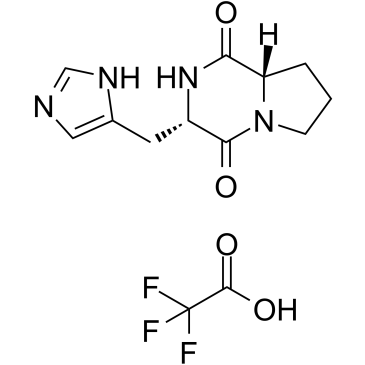Cyclo(his-pro) TFA (Synonyms: Cyclo(histidyl-proline) TFA; Histidylproline diketopiperazine TFA) |
| Catalog No.GC38761 |
Cyclo(his-pro) TFA (Cyclo(histidyl-proline) TFA) is an orally active cyclic dipeptide structurally related to tyreotropin-releasing hormone.
Products are for research use only. Not for human use. We do not sell to patients.

Cas No.: 936749-56-3
Sample solution is provided at 25 µL, 10mM.
Cyclo(his-pro) TFA (Cyclo(histidyl-proline) TFA) is an orally active cyclic dipeptide structurally related to tyreotropin-releasing hormone[1]. Cyclo(his-pro) TFA could inhibit NF-κB nuclear accumulation. Cyclo(his-pro) TFA can cross the brain-blood-barrier and affect diverse inflammatory and stress responses[2].
Cyclo(his-pro) TFA (Cyclo(histidyl-proline) TFA; 50 μM; 1-48 hours) increases the nuclear level of Nrf2 and inhibits NF-κB nuclear translocation. Cyclo(His-Pro) alone has no effect on nuclear translocation of these transcription factors[2]. Cyclo(his-pro) TFA (50 μM; prior to PQ exposure for 48 hours) abolishes protein nitration that followed paraquat (PQ) exposure and lessenes its functional consequences, as shown by decrease in cell apoptosis, detected by caspase 3 activity and by cytochrome c release[2]. Cyclo(his-pro) TFA inhibits NF-κB nuclear accumulation induced by paraquat in rat pheochromocytoma PC12 cells via the Nrf2/heme oxygenase-1 pathway[2]. Western Blot Analysis[1] Cell Line: PC12 cells
Cyclo(his-pro) TFA (Cyclo(histidyl-proline) TFA; 1.8 mg/ear; topical application on the right ear; 30 min prior to TPA) reduces TPA-induced ear oedema confirming that it can exert anti-inflammatory effect[2]. Cyclo(his-pro) TFA exerts in vivo anti-inflammatory effects in the central nervous system by down-regulating hepatic and cerebral TNFα expression thereby counteracting LPS-induced gliosis. Moreover, by up-regulating Bip, Cyclo(his-pro) increases the ER stress sensitivity andtriggers the unfolded protein response to alleviate the ER stress[3]. Animal Model: Sixty two/three month-old male C57BL/6 mice (25-30 g) [2]
[1]. Grottelli S, et al. The Role of Cyclo(His-Pro) in Neurodegeneration. Int J Mol Sci. 2016 Aug 12;17(8). pii: E1332. [2]. Minelli A, et al. Cyclo(His-Pro) exerts anti-inflammatory effects by modulating NF-κB and Nrf2 signalling. Int J Biochem Cell Biol. 2012 Mar;44(3):525-35. [3]. Bellezza I, et al. Neuroinflammation and endoplasmic reticulum stress are coregulated by cyclo(His-Pro) to prevent LPS neurotoxicity. Int J Biochem Cell Biol. 2014 Jun;51:159-69.
Average Rating: 5 (Based on Reviews and 10 reference(s) in Google Scholar.)
GLPBIO products are for RESEARCH USE ONLY. Please make sure your review or question is research based.
Required fields are marked with *




















